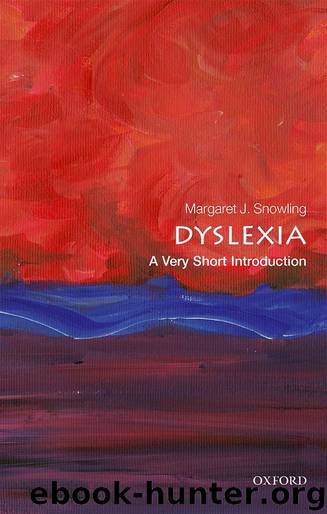Dyslexia by Margaret J. Snowling

Author:Margaret J. Snowling
Language: eng
Format: epub
ISBN: 9780192550422
Publisher: OUP Oxford
Published: 2019-04-02T16:00:00+00:00
Finding ‘dyslexia genes’
Estimating how much of the variability in reading in a population is due to genetic influences takes us some way towards understanding heritability, but it does not help us to identify the genes associated with dyslexia. From the outset it is important to understand that there is no single gene for dyslexia; rather, genetic influences on dyslexia are likely to be due to many genes with small effects operating together. In the past two decades there has been enormous interest in the molecular genetics of dyslexia. While progress has been rapid, and so-called candidate genes have been identified, we expect that there will be thousands of genes involved so there are still large gaps in understanding. It is often said that we are ‘a long way from accounting for the missing heritability’.
Before proceeding let us take a step back and rehearse what we know about how genes affect development. In each cell of the human body, there are twenty-three pairs of chromosomes (twenty-two pairs of autosomes and one pair of sex chromosomes). Chromosomes contain the hereditary material, or genes, from two parents and each person has two copies (or alleles) of each gene, one from their mother and one from their father. Genes are composed of sequences of DNA (deoxyribonucleic acid) and it is the sequences of DNA in the genes that carry what can be considered to be the ‘instructions’ for the development of the organism (see Figure 15). It is here, therefore, that the heritable differences between individuals originate.
15. The genetic make-up of an individual is contained in the chromosomes. This diagram illustrates how chromosomes comprise strings of genes. Some of the candidate genes associated with dyslexia risk include ROBO1 and KIAA0139 on chromosome 6.
Download
This site does not store any files on its server. We only index and link to content provided by other sites. Please contact the content providers to delete copyright contents if any and email us, we'll remove relevant links or contents immediately.
When Breath Becomes Air by Paul Kalanithi(7253)
Why We Sleep: Unlocking the Power of Sleep and Dreams by Matthew Walker(5636)
Paper Towns by Green John(4163)
The Immortal Life of Henrietta Lacks by Rebecca Skloot(3820)
The Sports Rules Book by Human Kinetics(3581)
Dynamic Alignment Through Imagery by Eric Franklin(3482)
ACSM's Complete Guide to Fitness & Health by ACSM(3459)
Kaplan MCAT Organic Chemistry Review: Created for MCAT 2015 (Kaplan Test Prep) by Kaplan(3418)
Introduction to Kinesiology by Shirl J. Hoffman(3297)
Livewired by David Eagleman(3113)
The River of Consciousness by Oliver Sacks(2988)
Alchemy and Alchemists by C. J. S. Thompson(2908)
The Death of the Heart by Elizabeth Bowen(2895)
Descartes' Error by Antonio Damasio(2728)
Bad Pharma by Ben Goldacre(2722)
The Gene: An Intimate History by Siddhartha Mukherjee(2488)
Kaplan MCAT Behavioral Sciences Review: Created for MCAT 2015 (Kaplan Test Prep) by Kaplan(2483)
The Fate of Rome: Climate, Disease, and the End of an Empire (The Princeton History of the Ancient World) by Kyle Harper(2429)
The Emperor of All Maladies: A Biography of Cancer by Siddhartha Mukherjee(2427)
